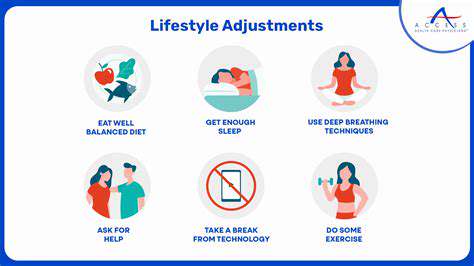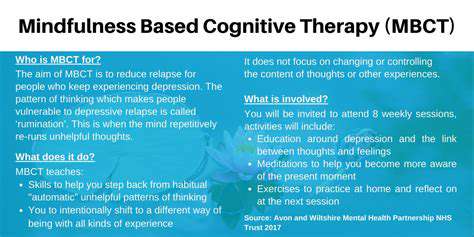Coping with Trembling During Anxiety Episodes

Mindfulness and Cognitive Techniques for Long-Term Management

Mindfulness and Attention Training
Mindfulness practices, a cornerstone of cognitive techniques, cultivate present-moment awareness. This involves focusing on the sensations, thoughts, and emotions without judgment. Regular mindfulness practice can significantly improve attention span and focus, allowing individuals to engage more effectively in tasks and daily activities. This heightened awareness can also lead to a greater sense of self-awareness, enabling individuals to identify and manage their responses to stress more effectively.
Specific attention training exercises, such as focusing on the breath or observing thoughts as they arise and pass, help to strengthen the ability to direct attention. This focused attention can be applied to various aspects of life, enhancing performance and well-being.
Cognitive Restructuring Techniques
Cognitive restructuring is a process of identifying and challenging negative or unhelpful thought patterns. These patterns can often lead to emotional distress and maladaptive behaviors. By recognizing these patterns, individuals can begin to reframe their thinking in a more positive and constructive way. This process fosters a more balanced and realistic perspective, empowering individuals to manage their emotional responses to challenging situations.
This involves actively identifying automatic negative thoughts (ANTs) and evaluating their validity. By replacing negative thoughts with more realistic and positive alternatives, individuals can reduce the impact of stress and anxiety. This approach is crucial for managing various mental health conditions.
Cognitive Behavioral Therapy (CBT)
CBT is a widely recognized therapy that combines cognitive and behavioral techniques. It emphasizes the connection between thoughts, feelings, and behaviors. Understanding these interconnected elements is key to identifying and modifying maladaptive patterns. This approach focuses on the present rather than dwelling on the past, empowering individuals to proactively manage their mental health.
CBT techniques, such as cognitive restructuring and exposure therapy, offer practical tools for addressing a wide range of mental health concerns, from anxiety and depression to stress management and relationship issues. This approach fosters personal growth and empowers individuals to lead more fulfilling lives.
Acceptance and Commitment Therapy (ACT)
ACT is a mindfulness-based therapy that encourages acceptance of unwanted thoughts and feelings. It emphasizes the importance of focusing on values and taking committed action to live in accordance with those values. The core concept of ACT is to accept what you cannot change and commit to what you can. This promotes resilience and enables individuals to navigate challenging situations with greater ease.
Mindfulness-Based Stress Reduction (MBSR)
MBSR programs combine mindfulness meditation with yoga and other relaxation techniques to reduce stress and improve overall well-being. These programs provide structured guidance and support for cultivating mindfulness skills in daily life. Practicing mindfulness can help individuals become more aware of their physical sensations, thoughts, and emotions, fostering a greater sense of calm and composure. This is particularly useful for individuals experiencing high levels of stress.
Mindfulness and Emotional Regulation
Mindfulness plays a crucial role in emotional regulation. By cultivating awareness of emotions as they arise, individuals can develop strategies for responding to them in a healthy and constructive manner. This awareness allows for greater emotional intelligence and self-compassion. It fosters a greater sense of self-control and allows individuals to manage their reactions to difficult situations and interactions more effectively, promoting overall mental well-being.
Mindfulness and Emotional Intelligence
Mindfulness practices contribute significantly to the development of emotional intelligence. By cultivating self-awareness, individuals can better understand their own emotions and those of others. This heightened awareness fosters empathy and compassion, leading to more effective communication and stronger relationships. Mindfulness also enhances the ability to regulate emotions, enabling individuals to respond to challenges with greater composure and understanding.